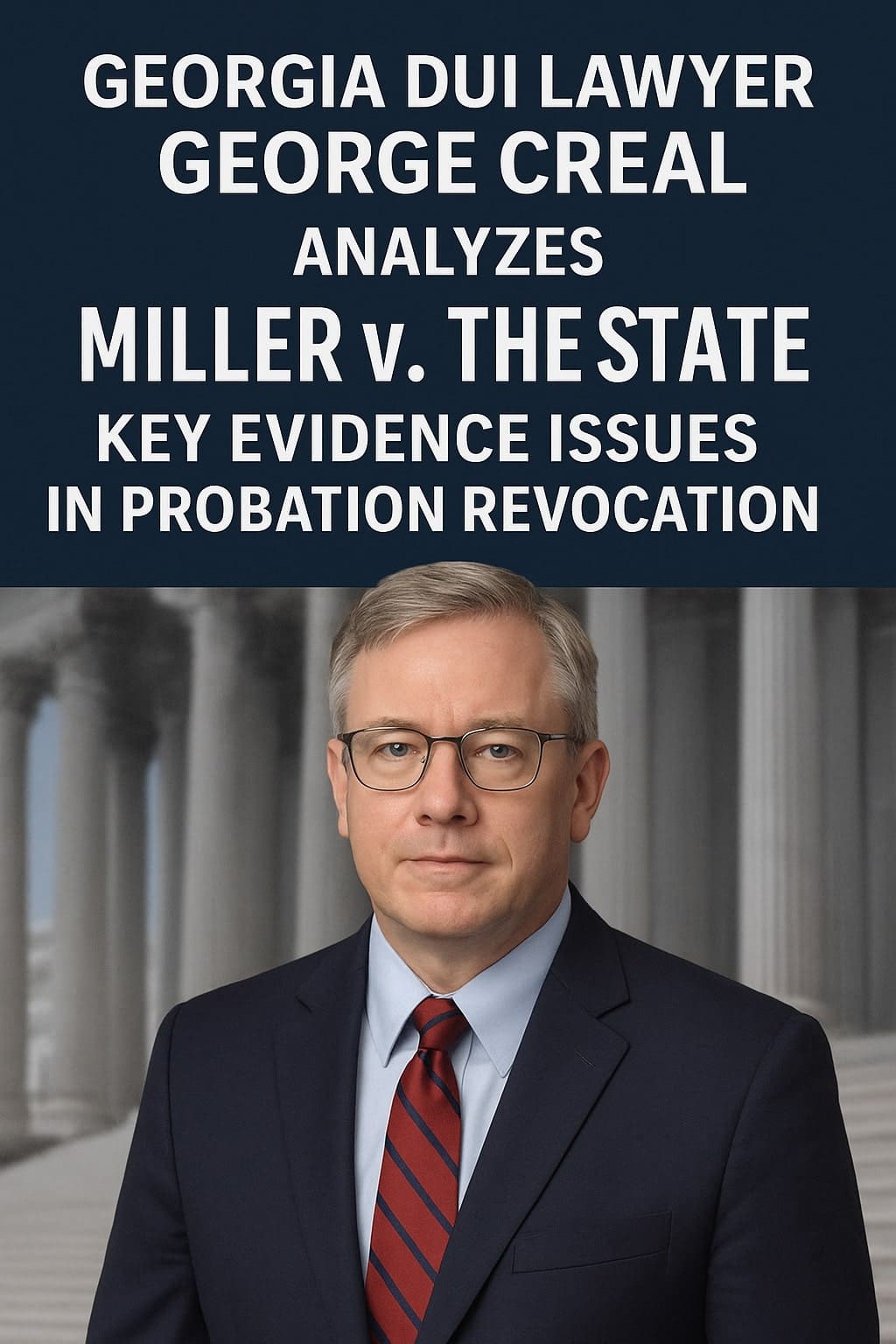For those facing DUI charges or probation revocation in Georgia, understanding evidence rules is critical. In Miller v. The State (912 S.E.2d 733, 2025), the Georgia Court of Appeals addressed key evidentiary issues in a probation revocation case involving alleged new offenses, including DUI. Augusta DUI attorney George Creal examines this ruling and its implications for defendants in Georgia.
Overview of Miller v. The State
Decided on February 14, 2025, Miller v. The State involved Mr. Miller’s appeal of a probation revocation for new offenses, including DUI, possession of firearms, and aggravated assault. The Court of Appeals affirmed the revocation for firearm possession and assault but reversed findings on traffic offenses, including DUI, due to insufficient evidence.
Case Background
In 2019, Miller pleaded guilty to robbery and aggravated assault, receiving a first-offender sentence of five years confinement and five years probation. After parole in 2022, he was accused of new offenses in 2023, including DUI, open container, failure to maintain lane, impeding traffic, firearm possession, and aggravated assault. Following hearings, the trial court revoked his probation, vacated his first-offender status, and sentenced him to 65 years confinement.

Key Evidentiary Issues
Miller challenged the trial court’s reliance on:
- Surveillance Video Testimony (June 2023 Incident): An investigator testified about a video showing Miller firing a handgun during an argument, identifying him in court. Miller argued this violated the best evidence rule (OCGA § 24-10-1002), requiring the original video. The Court found Miller waived this objection by soliciting a drawing of the scene, admitted at his request, and found no plain error.
- Hearsay in Firearm Possession (August 2023 Incident): A deputy testified Miller drove a vehicle containing three firearms. Miller claimed this was hearsay, as another officer found the weapons. The Court found no clear hearsay, as the deputy was present and didn’t repeat others’ statements, and Miller didn’t object at trial.
- Insufficient Evidence for Traffic Offenses: Miller argued no evidence supported findings of DUI, open container, failure to maintain lane, and impeding traffic. The Court agreed, finding no record evidence for these offenses, reversing these findings.
Court’s Ruling
The Court affirmed the probation revocation for two counts of firearm possession and aggravated assault, supported by a preponderance of evidence. However, it reversed the findings on DUI and traffic offenses due to lack of evidence, vacating the order and remanding for the trial court to reconsider the penalty based on remaining offenses.
Implications for DUI Defense
This case highlights critical lessons for DUI defendants in Georgia:
- Evidentiary Standards: Probation revocation requires only a preponderance of evidence, a lower threshold than criminal convictions, but courts must have competent evidence.
- Challenging Evidence: Defendants must object to improper evidence (e.g., hearsay, best evidence rule violations) at trial to preserve issues for appeal.
- DUI Evidence: The reversal of DUI findings underscores the need for prosecutors to present clear evidence, offering defense opportunities when evidence is lacking.
Why Trust George Creal?
With extensive experience in DUI defense across Georgia, George Creal leverages cases like Miller v. The State to craft robust defenses. Whether you’re in Augusta or elsewhere, George Creal’s expertise in Georgia evidence law can protect your rights and challenge weak evidence.
Contact George Creal Today
Facing DUI charges or probation revocation? Contact George Creal for expert legal guidance. Visit [insert website link] or call [insert phone number] for a consultation.
Miller v. The State clarifies evidentiary standards in probation revocation, offering both challenges and opportunities for DUI defendants. With George Creal’s experienced representation, you can navigate Georgia’s complex DUI laws effectively.

